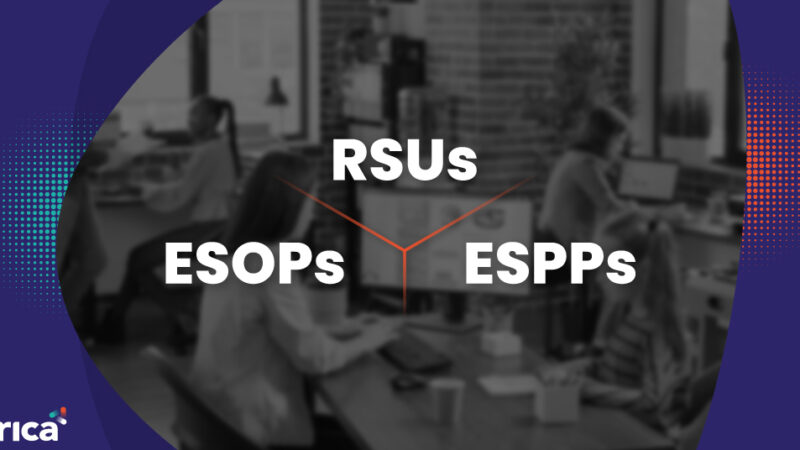
Can ESOPs Justify Lower Equity Compensation?
Ambitious individuals today are not biased towards corporate jobs, and are open to working for startups. Apart from the attractive compensation packages, startups provide fertile grounds for learning, nurturing new skills, and thinking out of the box. That said, early-stage startups have to deal with their share of challenges, including a limited cash pool to work with. They offer employee stock option plans (ESOPs) as compensation instead. Since the value rise of ESOPs would depend on the performance of the company, this motivates employees to work harder for the firm. Besides, many employers provide ESOPs to attract new talent and retain their services for extended periods.
This article aims to answer the question that keeps popping up within the startup community – can ESOPs justify lower equity compensation?
Before we examine how ESOsP add value to employees, let us get a basic understanding of what ESOPs are.
An ESOP is a contract between the employee and the company that allows the former to acquire company shares at a particular time and price.
As mentioned, startups offer their employees shares instead of hefty compensation packages.
How do ESOPs add value to employees?
1. Wealth creation opportunity
When stock options are added to your annual package, they can lead to sustained wealth creation.
In many cases, it is also excellent compensation for sub-market salaries, especially when you join an early-stage startup.
2. Employees benefit when the startup applies for an IPO
ESOPs benefit employees when the company applies for an Initial Public Offering (IPO) or executes a buyback. The Indian startup ecosystem has witnessed some interesting things unfold in the past few years. ESOP expansion, allocation, and buyback have increased at a rapid pace, indicating that the Indian ecosystem has come of age.
3. Motivates the workforce
ESOPs are also beneficial to align the interest of the workforce with the organization. As the employees are interested in creating wealth for themselves and the organization, it can be rewarding for all stakeholders in the long run.
It is also advantageous for startups to provide ESOPs and integrate the workforce with the ethos of the company, thereby securing a lower attrition rate.
Moreover, ESOPs can often be instrumental in drawing talent to the company workforce.
Some disadvantages of ESOPs
While there is no doubt that ESOPs have emerged as a powerful wealth-creation tool for employees, there are a few risks involved.
Here’s a list of a few drawbacks of ESOPs:
1. Employees may have to pay more tax
There are two main tax implications for ESOPs. One, the profit earned on ESOPs are considered capital gains, on which employees have to pay taxes as per their tax slab. The added tax burden is the second implication of ESOP taxation.
In most cases, ESOPs are offered at a lower than fair market value at the time of vesting. Therefore, any difference in the share value is the incentive earned by an employee.
Once ESOPs are converted into stocks and employees are unable to sell, it will attract additional tax that needs to be paid in the following financial year. It becomes critical for employees to work at a company with an impeccable ESOP policy. A well-planned ESOP policy allows employees to hold ESOPs till the next liquidity event, including exit, IPO, etc.
2. Failure in a public listing or buyback
Buybacks or public listings are typically low-frequency incidents when you receive ESOPs from an early-stage company. They are only hypothetical. Your return on ESOPs becomes contingent if the company doesn’t perform well in such situations.
Receiving ESOPs in addition to an at-market income has no apparent adverse effects. However, if it is in exchange for greater pay, you risk losing the value of the time and effort you have invested over the years.
3. The firm’s performance affects ESOPs
An ESOP buyback or IPO typically occurs only when the business has promising growth potential. Stock options will be affected by the company’s declining value, and you might not be able to sell your shares for a profit if that happens. You could lose financial gains over ESOPs along with competitive pay.
Final words
ESOPs can be an alternative to lower equity compensation, as they allow employees to share in the company’s ownership.
However, it’s important to note that the value of ESOP shares is dependent on the company’s performance and may not provide the same level of stability and predictability as equity compensation.
Additionally, ESOPs also come with specific administrative and legal requirements, so it’s important to consider the pros and cons before implementing ESOPs as an alternative to lower equity compensation.
This is why trica brings a suite of equity management and private investment monitoring solutions. Our services empower young startups to scale their cap table, create wealth-generation opportunities for their employees, and be transparent with their stakeholders.
If you are an early-stage startup founder looking for expert guidance on equity management, or a seasoned investor looking for efficient management of your investment portfolios, trica is the perfect solution for you.
Get in touch with our team today!
ESOP & CAP Table
Management simplified
Get started for free





